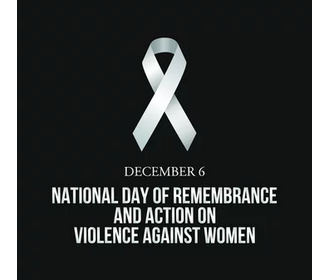
Remembering the Victims of Gender-Based Violence
Today we mark the National Day of Remembrance and Action on Violence Against Women. This day commemorates December 6, 1989, when 14 women were murdered at École Polytechnique in Montreal. Those who died were
Geneviève Bergeron
Hélène Colgan
Nathalie Croteau
Barbara Daigneault
Anne-Marie Edward
Maud Haviernick
Maryse Laganière
Maryse Leclair
Anne-Marie Lemay
Sonia Pelletier
Michèle Richard
Annie St-Arneault
Annie Turcotte
Barbara Klucznik-Widajewicz
This event was a flashpoint at the time in acknowledging the existence of gender-based discrimination and violence. And yet, more than three decades later, it still resonates with us. We must continue to acknowledge, address, and work towards ending the discrimination that, in Canada and around the world, disproportionately impacts women, girls, and 2SLGBTQI+ individuals.
Gender-based violence and discrimination often intersect with other types of discrimination, and these historical occurrences and present day lived experiences can have an impact on all of us in the education sector, but in particular on our students. As those working directly with students or supporting the educational work of our institution, we need to be aware of how we can nurture safe(r) learning environments.
But how can we do so competently and sensitively? On January 26, Diversity Circles is hosting an important workshop on “Creating Safe(r) Spaces: Trauma-Informed Practice“. Championed by FSA Member Yuna Chen, Health Promotion Strategist, this event will be led by Amea Wilbur Ed.D (she/her), Assistant Professor in Adult Education at the University of the Fraser Valley, and Dr. Brianna Strumm, PhD (she/her), Assistant Professor in the School of Social Work and Human Services at the University of the Fraser Valley.
Together we will learn about creating equitable and caring classrooms through recognizing that an individual’s past and present experiences can affect their learning, especially those who have experienced trauma. Specifically, we will cover
– the impact of trauma on learning in post-secondary environments
– what trauma-informed practice is, and how to proactively create a trauma-informed climate
– examples of healthy boundary setting when recognizing and working with students who have been exposed to trauma
– specific strategies for applying trauma-informed practices.
We can all contribute to working towards acknowledging and addressing gender-based discrimination and violence, including by learning how to create safe(r) environments on campus.
Shannon Kelly,
Vice President,
BCITFSA
